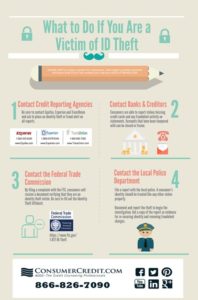Every time a data breach happens or the news reports on a scam, identity theft is mentioned. If you are unclear about what exactly happens or who is behind it all, you’re not alone. Unfortunately, identity theft can be very destructive. It can cause fraudulent debt in your name. That’s why it’s best to prevent it and fight against any future incidents. Identity Theft 101 is a crash course to help get you started.
Identity Theft 101
What is identity theft?
Identity theft occurs when someone uses your personal information for their own gain. This includes your name, Social Security number, credit card number or other identifying info. All this happens without your knowledge or permission.
The thief will either open a new account of some kind or use an existing one already opened by you. They may open a utilities account or credit card, go on a shopping spree, take out a loan or apply for Social Security benefits to name a few. Debt management from this is hard to deal with.
Why do identity thieves do it?
Identity thieves aren’t just committing a prank. They are out to swindle money away from you, commit fraud or other crimes. Occasionally, the victim and identity thief know one another. However, most of the time it’s an anonymous attack from a stranger.
How do identity thieves target people?
There are many types of identity theft scams, schemes, digital attacks and phishing strategies used to get access to personal information. Here are some examples:
- Phone Scams
- Dumpster Diving
- Mail Theft
- Stolen Wallet or Purse
- ATM Skimming
- Malware
There are certain groups of people who may be targeted more than others. Children, the elderly and those who primarily speak another language are at a higher risk. They can be more vulnerable, sometimes more trusting or completely unaware as with children.
How do I prevent identity theft?
Prevention is key to securing you and your family against identity theft. There are many ways to prevent identity theft.
- Shred all documents before throwing them out.
- Install security software on your computers and devices.
- Secure accounts online with strong and unique passwords.
- Regularly check your credit reports for any new accounts.
- Get identity theft insurance to monitor your credit report, plus get assistance if there is an incident.
- Consider a credit freeze when you are certain you won’t need to open any additional accounts for a while.
Checking your credit report and bank accounts frequently are two of the best things you can. However, all these tips and more should be utilized.
What happens if I am a victim of identity theft?
If you become a victim, identity theft 101 has you covered with some of the basics. While it depends on the severity of the breach, it may take a while to get everything in order. Here is an overview of the steps to take:
- Notify your banks and creditors.
- Contact the three credit reporting agencies.
- Contact the Federal Trade Commission.
- File a police report.
- Contact your creditors with the paperwork you have filed.
Each year, millions of Americans have their identity stolen. Consumers whose identities have been stolen can spend years clearing up their good name and credit. Therefore, the best way to help prevent becoming a victim of Identity Theft is to safeguard your personal information with preventative measures.
If you’re struggling to pay off debt, ACCC can help. Schedule a free credit counseling session with us today.







